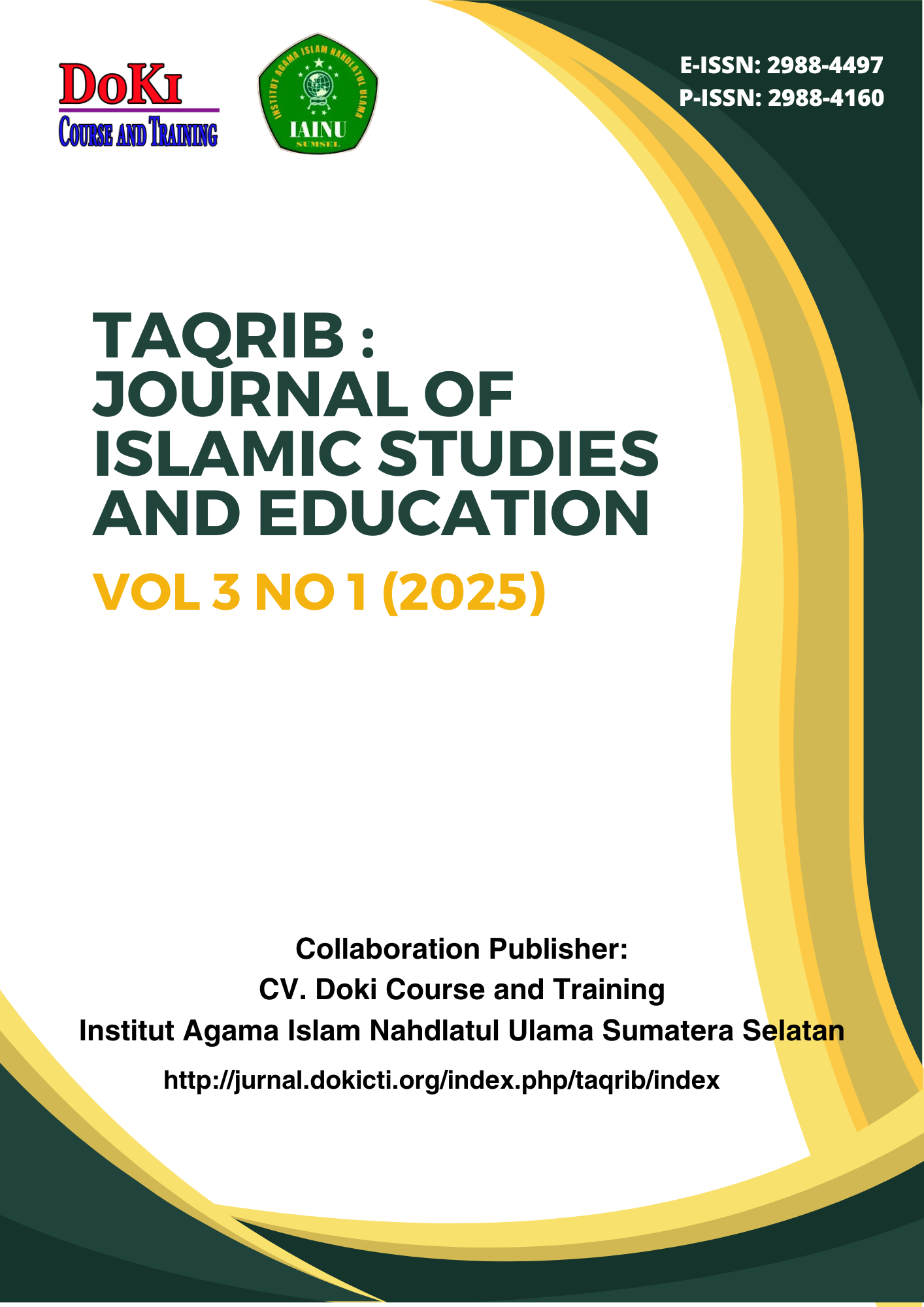Keutamaan Shalat Dalam Kehidupan Sehari-Hari Menurut Ustadz Abdul Somad
DOI:
https://doi.org/10.61994/taqrib.v3i1.1032Keywords:
Dakwah, Sholat, SosialAbstract
Shalat merupakan fondasi utama dalam kehidupan seorang Muslim yang tidak hanya berfungsi sebagai bentuk ibadah ritual, tetapi juga sebagai media pembinaan karakter, pengendalian diri, dan pembangunan sosial. Artikel ini bertujuan untuk mengkaji keutamaan sholat dalam kehidupan sehari-hari dengan menyoroti dua dimensi utama, yaitu fungsi individual dan fungsi sosial. Kajian ini juga mengangkat pandangan Ustadz Abdul Somad (UAS) sebagai referensi kontekstual dalam menyampaikan urgensi dan manfaat shalat di era modern. Dengan menggunakan pendekatan kualitatif deskriptif dan kajian pustaka dari buku, artikel jurnal, serta ceramah Ustadz Abdul Somad, ditemukan bahwa shalat memiliki pengaruh signifikan terhadap pembentukan kepribadian Muslim yang disiplin, tenang, dan bermoral, serta memperkuat nilai-nilai kebersamaan dalam masyarakat. Pesan-pesan dakwah Ustadz Abdul Somad dinilai sangat relevan dalam menjawab tantangan spiritual dan sosial di era globalisasi, di mana sholat menjadi titik tolak transformasi menuju kehidupan yang lebih bermakna dan harmonis. Artikel ini menegaskan bahwa shalat tidak hanya sebagai kewajiban teologis, tetapi juga sebagai kebutuhan esensial dalam kehidupan sehari-hari yang mampu membentuk peradaban Islam yang tangguh dan beradab
References
Abdul Aziz, A., Mamat, M. N., Salleh, D. M., Abdullah, S. F., & bin Nordin, M. N. (2021). Analysis of literature review on spiritual concepts according to the perspectives of the al-Quran, Hadith and Islamic scholars. Turkish Journal of Computer and Mathematics Education, 12(9), 3152–3159.
Al Amin, N. U., Taufik, E. T., Mufidatunrofiah, S., & Rifai, I. A. (2020). Kejawen, multiculturalism, and principles of the Qur’an: Transformation and resupposition of QS. al-Kafirun (109): 6 in Urip Sejati community of Yogyakarta. ESENSIA: Jurnal Ilmu-Ilmu Ushuluddin, 21(1), 71–90.
Aulia, I. (2024). Involving Allah Swt. In every situation through psychospiritual prayer and zikr based on the perspective of Imam Al-Ghazali. Spirituality and Local Wisdom, 3(1), 18–27.
Awaru, A. O., Jumadi, & Sadriani, A. (2024). Sibaliparriq local wisdom as a model for children’s education in coastal families of Polewali Mandar. Komunitas, 16(1), 78–91.
Bensaid, B. (2021). An overview of Muslim spiritual parenting. Religions, 12(12), 1057.
Bounds, E. M. (2022). Preacher and prayer. DigiCat.
Chamsi-Pasha, M., & Chamsi-Pasha, H. (2021). A review of the literature on the health benefits of salat (Islamic prayer). Medical Journal of Malaysia, 76(1), 93–97.
Cole, A. H. (2020). Prayer. In Encyclopedia of psychology and religion (pp. 1818–1821). Springer International Publishing.
Danti, R. R., Syafe’i, I., & Sagala, R. (2024). Educator concepts and competencies from Imam Al-Ghazali’s perspective: Study of the book of Ihya’ Ulumuddin and Minhajul Muta’alim and their relevance to contemporary Islamic education. Bulletin of Science Education, 4(1), 51–70.
Dastak, F. A., & Dehdehi, A. (2024). Role of prayer in establishing family foundations and dealing with social disasters, based on the teachings of Ahl al-Bayt (as). Journal of Ahl Al-Bayt (as) Teachings, 1(3).
Froese, P., & Jones, R. (2021). The sociology of prayer: Dimensions and mechanisms. Social Sciences, 10(1), 15.
Froese, P., & Uecker, J. E. (2022). Prayer in America: A detailed analysis of the various dimensions of prayer. Journal for the Scientific Study of Religion, 61(3), 663–689.
Genc, H. (2023). The effect of the view that ‘diversion of faith-act’ on prayers. Amasya İlahiyat Dergisi, 21, 499–521.
Guglielmi, M., & Sbalchiero, S. (2024). Does sharing place of worship matter in enhancing interreligious dialogue initiatives? Insights from the congregations study in three Italian cities. In Religion between governance and freedoms (pp. 223–240). Springer Nature Switzerland.
Hamilton, J. B., Kweon, L., Brock, L. U., & Moore, A. D. (2020). The use of prayer during life-threatening illness: A connectedness to God, inner-self, and others. Journal of Religion and Health, 59(4), 1687–1701.
Hodge, D. R. (2020). Religious congregations: An important vehicle for alleviating human suffering and fostering wellness. Journal of Religion & Spirituality in Social Work: Social Thought, 39(2), 119–137.
Hoelzchen, Y. M. (2022). Mosques as religious infrastructure: Muslim selfhood, moral imaginaries and everyday sociality. Central Asian Survey, 41(2), 368–384.
Jashimuddin, M. (2024). Existential crisis in modern man’s life through the lens of Franz Kafka’s “Metamorphosis". Qualitative Research.
Karimullah, S. S. (2023). The role of mosques as centers for education and social engagement in Islamic communities. Jurnal Bina Ummat, 6(2), 151–166.
Lovelace, R. F. (2020). Dynamics of spiritual life: An evangelical theology of renewal. InterVarsity Press.
Nasution, Z. A. (2024). A thematic study on the concept of hope in prayer (Al-tama’) and its implementation in the modern era: Perspectives from Q. Shihab and W. al-Zuḥailī. Jurnal Ilmiah Mahasiswa Raushan Fikr.
Prayogi, A., & Nasrullah, R. (2024). Study of the urgency of Islam as a religion in the current of modernity. Al-Musthalah: Jurnal Riset Dan Penelitian Multidisiplin, 1(2), 183–197.
Rahner, K. (2023). The need and the blessing of prayer. Liturgical Press.
Scales, A. (2024). Sacred practices of affirmation, meditation and worship. Albert Scales.
Sells, J. N., Trout, A., & Sells, H. C. (2024). Beyond the clinical hour: How counselors can partner with the church to address the mental health crisis. InterVarsity Press.
Siadeka, G., Yasin, T. M., & Shadiqin, S. I. (2020). The spirituality of urban society. Journal of Society Innovation and Development, 2(1), 1–21.
Siswanto. (2022). Strengthening spiritual leadership in preserving religious culture and local wisdom in madrasah. AL-TANZIM: Jurnal Manajemen Pendidikan Islam, 6(3), 907–920.
Suhardi. (2025). The effectiveness of structural da’wah Friday worship in Gowa Regency in improving the quality of community piety. TOPLAMA, 2(2), 54–62.
Downloads
Published
Issue
Section
License
Copyright (c) 2025 Alihan Satra, Salwa Pratiwi, Merza Kellyn Rahmadilla, Jayadi Ramadhan, Ramba Pernanda

This work is licensed under a Creative Commons Attribution-ShareAlike 4.0 International License.

Taqrib : Journal of Islamic Studies and Education by https://jurnal.dokicti.org/index.php/JIPBS/index
is licensed under a Creative Commons Attribution-ShareAlike 4.0 International Licensel









